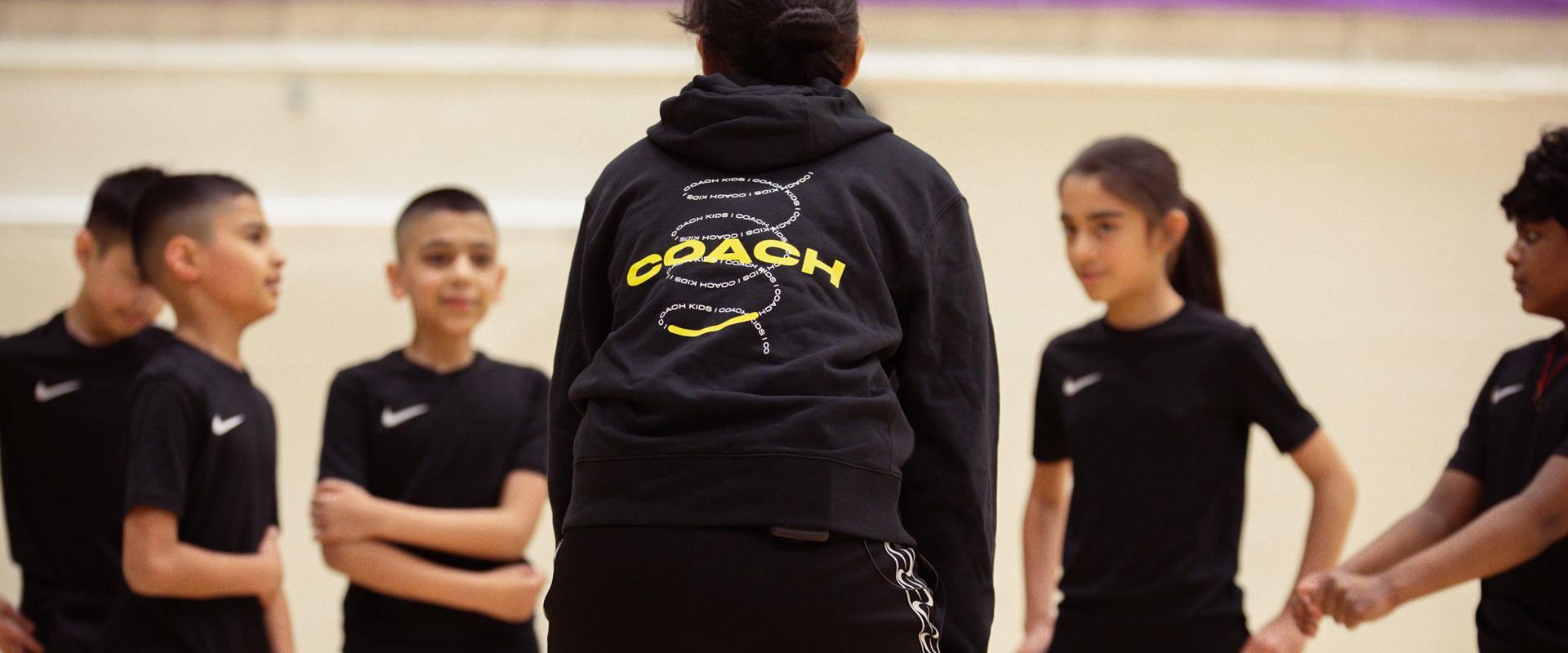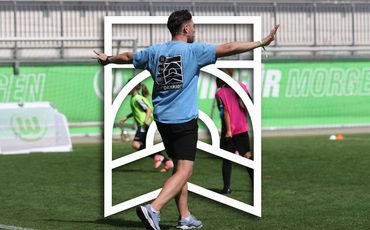
Become a More Resilient Coach
with Professor Wade Gilbert
The ability to bounce back from the many setbacks that coaches inevitably experience during a long season and over the course of several seasons is a sign of resilience. Resilience is about much more than enduring the rough patches in coaching; it involves handling those tough situations with resolve and reserve. Accordingly, veteran coaches who demonstrate resilience are often described as highly disciplined, confident, and optimistic problem-solvers. A useful combination of qualities for any coach.
Coaching Can Feel Like a Sink or Swim Activity At Times.
It is no surprise then that coaches who recognize the value of resilience in sport seek out athletes who demonstrate this attribute. A legendary Hall of Fame and national champion college coach once described to me her time-tested strategy for identifying the most desirable athletes in recruiting. When attending high school and club tournaments she would focus on how athletes responded when not performing their best and when their team was losing badly. It is an athlete’s actions during those moments of discouragement and struggle that provide insight as to her or his resilience.
One of the most effective ways to build resilience in athletes is to model it as a coach. A recent review of research on how to become more resilient concluded that “The value of a recovery period rises in proportion to the amount of work required.” Coaching takes a lot of work. It can be physically and emotionally exhausting. But there is a common misconception among coaches that constantly pushing through exhaustion is a sign of resilience. True resilience is in fact just the opposite.
Successful coaches are resilient because they learn to refresh by building in regular recovery periods that allow them to sustain the energy required to complete challenging tasks, like coaching effectively through an entire season. Strategies for developing such resilience are sometimes divided into internal and external recovery strategies.
Internal recovery strategies are the small rituals that coaches should build into their daily routines for use throughout the year.
• Much like athletes are taught to insert rest and recovery breaks into their training sessions, coaches too will benefit from taking this same approach to build their resilience. Coaches should consciously schedule brief mental and physical breaks across the day to recharge. During these breaks, which can be as short as a few minutes, the goal is to shift thinking away from coaching.
• The refocus should be something that restores energy, not further drains it. It could be a reminder to text or phone a friend or family member, listen to a song or check your favorite newsfeed, or simply find a quiet place to sit and observe your surroundings.
• Coaches may find it helpful to set alarms or reminders using their watch or a smart phone to cue them to pause or redirect their focus away from coaching at strategic moments across the day. Recommended reminder apps include: Any.DO, Begin, BZ Reminder, Checkmark 2, Clear Due, Just Reminder, and Life Reminders.
External recovery strategies are the longer physical and mental breaks that coaches should take during the off-season. The key to using off-season – or external recovery strategies – to build resilience is understanding that just stopping coaching for a short period of time does not equal recovery. True recovery requires stepping away – physically, mentally and emotionally – from coaching for dedicated periods of time during the off-season. An external recovery strategy for building resilience I have seen used by all successful coaches is off-season focused reading.
• Throughout the year keep a running list of recommended books that you hear about from other coaches or on social media. The best coaches are constantly adding books to their ‘must read’ list. At the start of your off-season revisit the list and select a few that are most likely to help build resilience. A simple way to identify which books on your list will be most valuable for helping you build and restore resilience is to ask yourself the following questions:
- Which 2-3 books on this list have been most frequently recommended to me by other coaches and trusted members of my coaching network?
- Which 2-3 books on this list do I think will have the most practical examples and anecdotes I will be able to use with the type of athletes I will be coaching next season?
- Which 2-3 books on this list will most stretch me out of my comfort zone and broaden my knowledge (books I normally wouldn’t select on my own if I were to walk through a bookstore)?
• Aim to read at least one book that is not specifically about sport or coaching. When you read and learn outside of sport and coaching, it gives you a broader perspective on life and success. It also equips you with a deeper well of stories to share with your athletes at strategic moments in the season. Your ability to reference a wide range of resilience examples leads to more powerful coaching. It enhances athlete perceptions of your expertise, which is associated with greater athlete confidence and satisfaction.
• Reading about how others overcome struggles appears to be a particularly valuable strategy for building resilience and improving performance. Books such Long Walk to Freedom, Unbroken, and Endurance: Shackleton’s Incredible Voyage are three of my favorites. Books like these provide vivid accounts of resilience under extreme conditions. You can refer back to these examples to strengthen resolve when you and/or your athletes are faced with difficult circumstances that challenge your mental, emotional and/or physical limits.
• Finally, consider inviting another coach to read the books with you at the same time. Schedule a regular time to meet and discuss what you are learning from the book, and how the lessons can be applied to coaching. Not only will this help keep you on task so you can finish the books during the off-season, but it will also strengthen your coaching network – another key source of resilience.
The best athletes are resilient; the same holds true for the best coaches. But resilience must be built and constantly restored in order to coach at your best across a long and challenging season. Simple and effective ways to build resilience are to use tools that will remind you to take regular brief moments of recovery during the season (internal recovery strategies), and use your off-season to deepen your knowledge about how others have modeled resilience when pushed to the limit (external recovery strategies).
References
Achor, S., & Gielan, M. (2016, June 24). Resilience is about how you recharge, not how you endure. Harvard Business Review. Retrieved from https://hbr.org/2016/06/resili...
AppsDose. (n.d.). 5 best reminder apps for iPhone 2016. Retrieved from http://www.appsdose.com/2015/0...
Fletcher, D., & Sarkar, M. (2012). A grounded theory of psychological resilience in Olympic champions. Psychology of Sport and Exercise, 13, 669-678.
Hillenbrand, L. (2014). Unbroken: A World War II story of survival, resilience, and redemption. New York: Random House.
Hindy, J. (2015, November 9). 10 best reminder apps for Android. Android Authority. Retrieved from http://www.androidauthority.co...
Lansing, A. (2015). Endurance: Shackleton’s Incredible Voyage. New York: Basic Books.
Lin-Siegler, X., Ahn, J. N., Chen, J., Fang, F-F, A., & Luna-Lucero, M. (2016). Even Einstein struggled: Effects of learning about great scientists’ struggles on high school students’ motivation to learn science. Journal of Educational Psychology, 108(3), 314-328.
Mandela, N. (1995). Long walk to freedom: The autobiography of Nelson Mandela. Boston: Little, Brown and Company.
Rylander, P. (2016). Coaches’ bases of power and coaching effectiveness in team sports. International Sport Coaching Journal, 3, 128-144.
Young, J. A. (2014). Coach resilience: What it means, why it matters and how to build it. ITF Coaching and Sport Science Review, 63(22), 10-12.
Contributor:

Professor Wade Gilbert
Wade is a professor in coaching and sport psychology at Fresno State University in the USA. Wade is an internationally renowned coaching consultant and sport scientist and an award-winning professor in the Department of Kinesiology at Fresno State University. His Main areas of interest are in coach learning and building positive learning culture for coaches.
Comments
Related Pages


